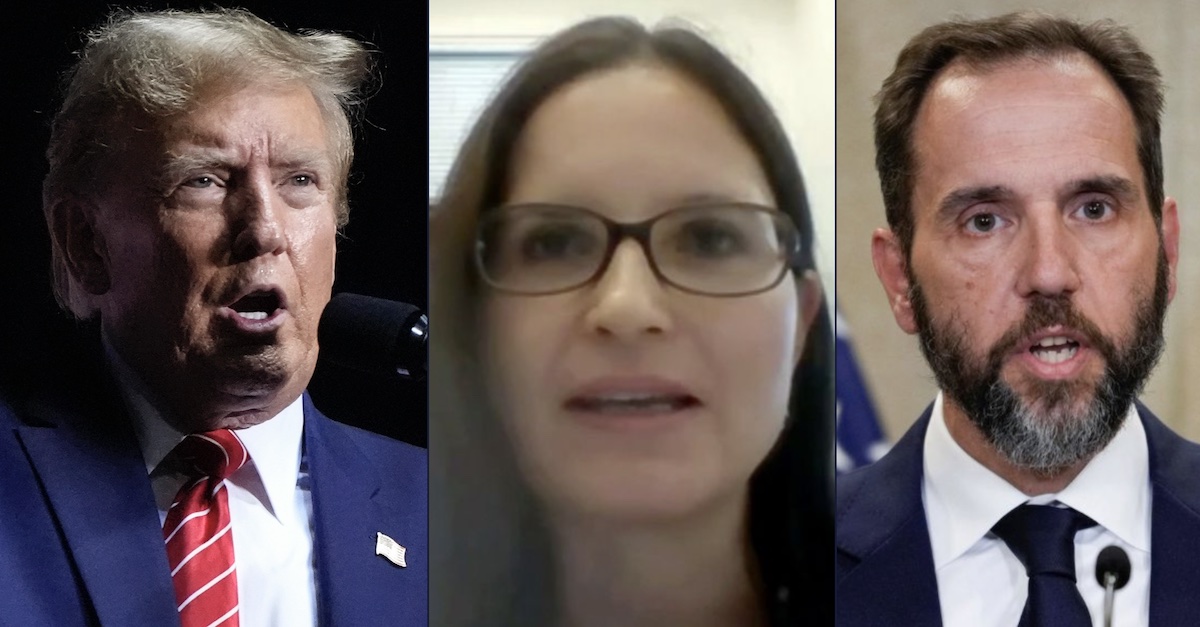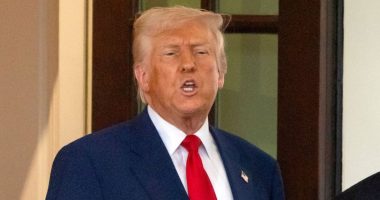
Left: Donald Trump (AP Photo/Mike Stewart); Center: U.S. District Judge Aileen Cannon (U.S. Senate); Right: Special counsel Jack Smith (AP Photo/J. Scott Applewhite)
A large cache of documents recently unsealed in Donald Trump’s Mar-a-Lago documents case offer key insights into the pre-indictment thought processes of both the government and the defense.
The documents were recently unsealed by U.S. District Judge Aileen Cannon but have long been attached to a late March Trump motion, previously filed under seal, in support of a motion to dismiss the case.
That motion to dismiss alleges prosecutorial misconduct and due process violations. Spanning 15 different exhibits and over 160 pages, the defense attached numerous emails, grand jury materials, and court rulings from outside the Southern District of Florida when prosecutors were considering filing the case in Washington, D.C.
Each addition to the public record would, at least in theory, be in service of the defense’s arguments in the motion itself. But one particular exhibit – a December 2022 grand jury interview between federal investigators and then-Trump attorney Timothy Parlatore – is not cited in the corresponding support motion whatsoever.
The transcript contains only a snippet of the conversation between Department of Justice Attorney Julie Edelstein and the since-scuttled Trump attorney – and picks up in the middle of a sentence.
“I can’t,” Parlatore says.
The prosecutor begins to respond: “A couple questions ––”
“It’s privileged,” the attorney quickly intends to cut her off.
The prosecutor finishes her ask: “–– on that.”
Somewhat aggrieved, Parlatore goes on to lecture the federal legal employees about the attorney-client privilege.
“Which is something that she knows,” the defense lawyer says. “If –– it’s something that every ––”
Edelstein breaks in: “Is there a limitation ––”
Parlatore sort of struggles to finish his thought: “–– attorney ––”
The prosecutor similarly struggles to complete her own: “–– on ––”
“It’s something that every attorney does know,” the defense attorney finally says, making his point over the cross-talk.
Edelstein presses on: “Is there a limitation that, for the communication to be attorney/client privilege, it must [sic] for the purpose of asking legal advice?”
“Any information obtained from a client is part of, you know, legal advice or representation,” Parlatore answers. “Yes.”
The basic legal explaining and counter-explaining goes on a bit longer.
“And are you aware that a client can waive that?” Edelstein asks.
To which Parlatore replies: “I am aware that a client can waive that.”
The DOJ attorney then zeroes in on her own overarching point: “And if the former President’s so cooperative, why hasn’t he allowed you to share his conversations with the Grand Jury today?”
Obviously flabbergasted by the implication and efforts to get around the attorney-client privilege, Trump’s defense attorney says: “Are you — are we really doing this?”
“I asked you a question,” Edelstein replies.
More Law&Crime coverage: The Trump Docket: The ‘collateral consequences’ of a Trump conviction must not supersede justice, expert prosecutor says
While not cited in the actual defense motion, the inclusion of the portion of Parlatore’s testimony, appears intended to galvanize support for the idea – often floated by the 45th president and his allies – that federal prosecutors have played fast and loose with the rules at various steps in order to move the Mar-a-Lago case forward.
Another exhibit filed along with the document tranche is an 87-page March 2023 ruling by U.S. District Judge Beryl A. Howell, sitting in D.C., concerning the classified documents case – which was then referred to in court filings as a case having to do with a grand jury subpoena.
The opinion summarizes the broad outlines of what the defense attorney and the government discussed:
At the December 9, 2022, sealed hearing, both parties clarified the tasks yet to be done to constitute full compliance with the May 2022 Subpoena. After much back-and-forth between the parties regarding what had and had not been provided by the Office thus far, the Court ascertained the following terms for the Office’s full compliance: (1) Parlatore would testify before the grand jury regarding the Office’s efforts and due diligence to respond to the May 2022 subpoena, including testifying to information not already mentioned in the revised certification and details regarding how Parlatore determined which locations needed to be searched and when, why certain locations were selected to be searched and others not, efforts by [redacted] to prepare to sign the June 3, 2022 certification, the identities of the search-team members, and those members’ exact search methodologies, (2) the revised certification as well as Parlatore’s grand jury testimony would discuss accommodations the Office made for the “shell game,” as coined by the government, whereby documents could be moved between locations based on scheduled dates for searches of those locations, to avoid detection of those responsive records, and (3) Parlatore, or any individual put forward to the grand jury regarding the May 2022 subpoena, need not be labeled a “custodian” as long as they possess all the required first-hand information…
The scope of information the government sought had one clear sticking point. The government made clear that Parlatore, or any other witness made available to testify about the conduct of the search for responsive documents, might be asked questions about the content of direct conversations with the former president.
On Aug. 8, 2022, federal agents raided Trump’s Palm Beach compound — part residence, part private club — returning with file boxes upon file boxes containing what federal prosecutors allege were illegally retained classified documents. Special counsel Jack Smith ultimately filed the indictment in Florida in June 2023.
Trump’s underlying support motion is available here.
Have a tip we should know? [email protected]







